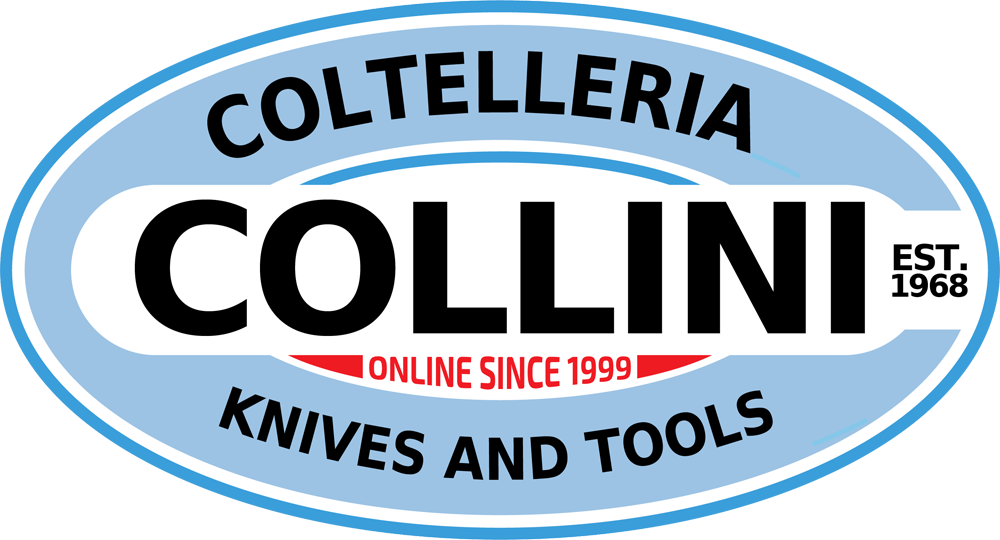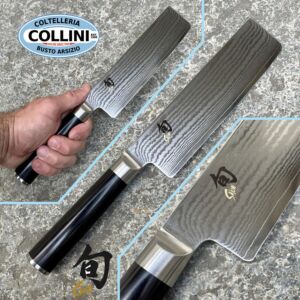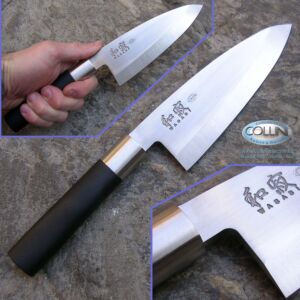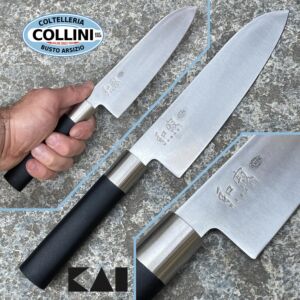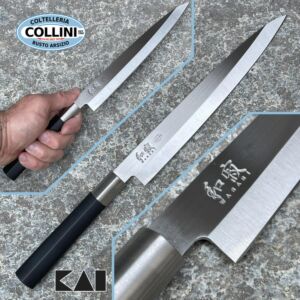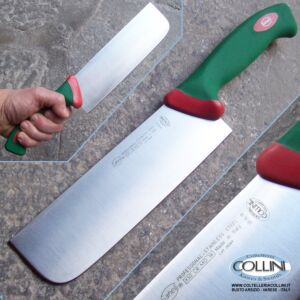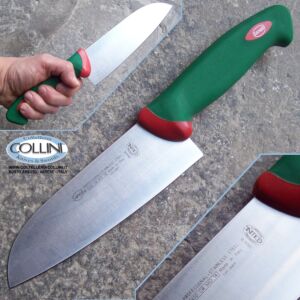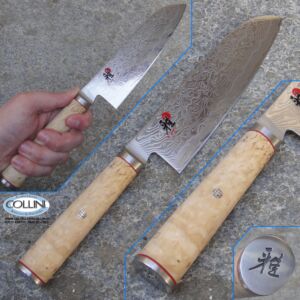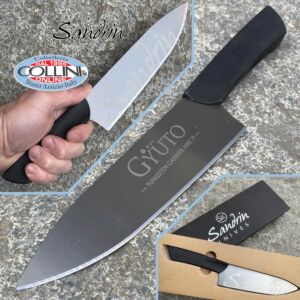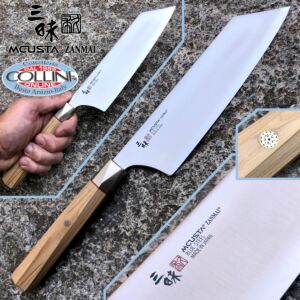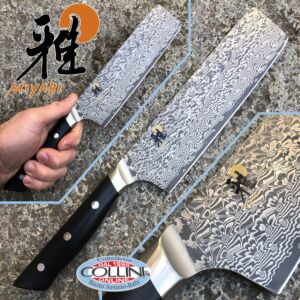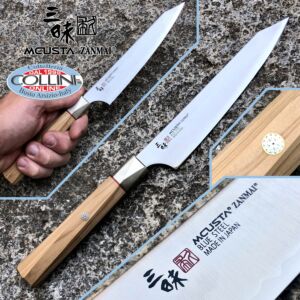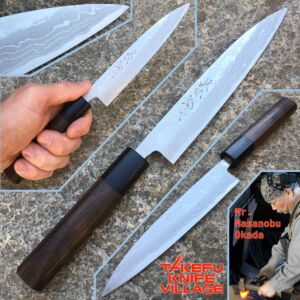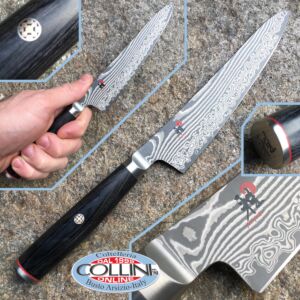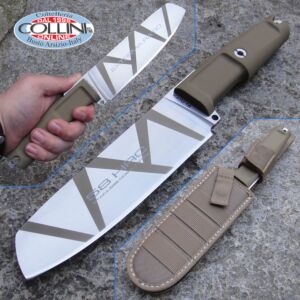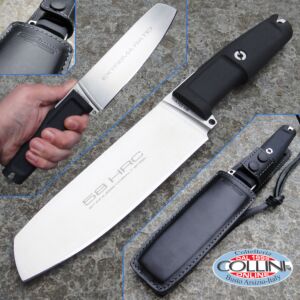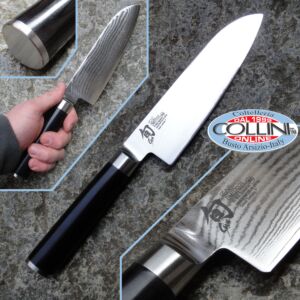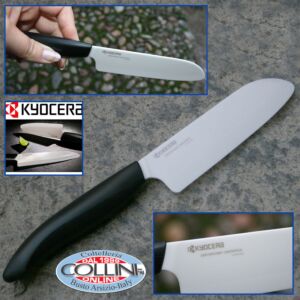Coltelli da cucina giapponesi: caratteristiche e tipologie
-
Kai Japan - Shun DM-0728 - Nakiri Knife 165mm - kitchen knives
Shun Classic is one of the flagship lines of the Kai Group (which currently also includes the Kershaw and Zero Tolerance brands), a famous Japanese manufacturer of knives and razors since the early 1900s. This is a series of knives and kitchen accessories suitable for professionals and enthusiasts.
The blades are made of rolled steel consisting of an inner layer of VG-10 stainless steel and two outer cheeks of 32-layer damask. The result is excellent cutting capacity combined with excellent edge retention and good flexibility, which is also guaranteed by the differentiated tempering.
Today, these knives represent the pinnacle of Japanese culinary technology. The quality does not stop with the steel used, however, but continues with the care of the workmanship (sharpening in particular) and the materials used, such as the splendid Pakkawood used for the handles.
Blade: 32-layer Damascus laminate and VG-10 stainless steel
Handle: Black Pakkawood
Blade length: 165 mm
Blade thickness: 2.5 mm.
Total length: 300 mm.
Weight: 230 g.
Notes: not dishwasher safeDM-0728 -
Kai Japan - Wasabi 6710D - Deba Knife 105mm - kitchen knife
The Wasabi series by Kai is the entry level line offered by the Kai Group (which currently also includes the Kershaw and Zero Tolerance brands), a famous Japanese manufacturer of knives and razors since the early 1900s. It is a series of knives and kitchen accessories suitable for professionals and enthusiasts that stands out for its excellent price/quality ratio. It offers stainless steel blades and ergonomic polypropylene handles with added Bamboo powder that are heat resistant up to 100°C and therefore dishwasher safe.
Kai Japan - Wasabi - Deba 105mm.
Due to the special cutting edge, this knife is not suitable for left-handed people.
Blade: M.V. Stainless Steel, polished steel
Handle: combination of bamboo powder and black polypropylene - Heat-resistant up to 100°C
Blade length: 105 mm.
Blade thickness: 3 mm.
Total length: 240 mm.
Weight: 94 g.
Notes: dishwasher-safe, however we recommend hand washing as this will better preserve materials and finish over time6710D -
Kai Japan - Wasabi 6715D - Deba Knife 150mm - kitchen knife
The Wasabi series by Kai is the entry level line offered by the Kai Group (which currently also includes the Kershaw and Zero Tolerance brands), a famous Japanese manufacturer of knives and razors since the early 1900s. It is a series of knives and kitchen accessories suitable for professionals and enthusiasts that stands out for its excellent price/quality ratio. It offers stainless steel blades and ergonomic polypropylene handles with added Bamboo powder that are heat resistant up to 100°C and therefore dishwasher safe.
Kai Japan - Wasabi - Deba 150mm.
The thick blade allows this knife to be used as a cleaver.
Due to the special cutting edge, this knife is not suitable for left-handed people.Blade: M.V. Stainless Steel, polished steel
Handle: combination of bamboo powder and black polypropylene - Heat-resistant up to 100°C
Blade length: 150 mm.
Blade thickness: 5 mm.
Total length: 285 mm.
Weight: 260 g.
Notes: dishwasher-safe, however we recommend hand washing as this will better preserve materials and finish over time6715D -
Kai Japan - Wasabi 6715Y - Yanagiba Knife 155mm - kitchen knife
The Wasabi series by Kai is the entry level line offered by the Kai Group (which currently also includes the Kershaw and Zero Tolerance brands), a famous Japanese manufacturer of knives and razors since the early 1900s. It is a series of knives and kitchen accessories suitable for professionals and enthusiasts that stands out for its excellent quality/price ratio. It offers stainless steel blades and ergonomic polypropylene handles with added Bamboo powder that are heat resistant up to 100°C and therefore dishwasher safe.
Kai Japan - Wasabi - Yanagiba 155mm.
Due to the special cut, this knife is not suitable for left-handed people.Blade: M.V. Stainless Steel, polished steel
Handle: combination of bamboo powder and black polypropylene - Heat-resistant up to 100°C
Blade length: 155 mm.
Blade thickness: 3 mm.
Total length: 290 mm.
Weight: 106 g.
Notes: dishwasher-safe, however, we recommend hand-washing which, over time, better preserves materials and finish6715Y -
Kai Japan - Wasabi 6716N - Nakiri Knife 165mm - kitchen knife
The Wasabi series by Kai is the entry level line offered by the Kai Group (which currently also includes the Kershaw and Zero Tolerance brands), a famous Japanese manufacturer of knives and razors since the early 1900s. It is a series of knives and kitchen accessories suitable for professionals and enthusiasts that stands out for its excellent price/quality ratio. It offers stainless steel blades and ergonomic polypropylene handles with added Bamboo powder that are heat resistant up to 100°C and therefore dishwasher safe.
Kai Japan - Wasabi - Nakiri 165mm.
Blade: M.V. Stainless Steel, polished steel
Handle: combination of bamboo powder and black polypropylene - Heat-resistant up to 100°C
Blade length: 165 mm.
Blade thickness: 3 mm.
Total length: 300 mm.
Weight: 170 g.
Notes: dishwasher-safe, however we recommend hand washing as this will better preserve materials and finish over time6716N -
Kai Japan - Wasabi 6716S - Santoku Knife 165mm - kitchen knife
The Wasabi series by Kai is the entry level line offered by the Kai Group (which currently also includes the Kershaw and Zero Tolerance brands), a famous Japanese manufacturer of knives and razors since the beginning of the 1900s. It is a series of knives and kitchen accessories suitable for professionals and enthusiasts that stands out for its excellent price/quality ratio. It offers stainless steel blades and ergonomic polypropylene handles with added Bamboo powder that are heat resistant up to 100°C and therefore dishwasher safe.
Kai Japan - Wasabi - Santoku 165mm.
Blade: M.V. Stainless Steel, polished steel
Handle: combination of bamboo powder and black polypropylene - Heat resistant up to 100°C
Blade length: 165 mm.
Blade thickness: 3 mm.
Total length: 300 mm.
Weight: 146 g.
Notes: dishwasher-safe, however we recommend hand washing as this will better preserve materials and finish over time6716S -
Kai Japan - Wasabi 6721D - Deba Knife 210mm - kitchen knife
The Wasabi series by Kai is the entry level line offered by the Kai Group (which currently also includes the brands Kershaw and Zero Tolerance), a famous Japanese manufacturer of knives and razors since the beginning of 1900. It is a series of knives and kitchen accessories suitable for professionals and enthusiasts that stands out for its excellent quality/price ratio. It offers stainless steel blades and ergonomic polypropylene handles with added Bamboo powder that are heat resistant up to 100°C and therefore dishwasher safe.
Kai Japan - Wasabi - Deba 210mm.
Due to the special cut, this knife is not suitable for left-handed people.
Blade: M.V. Stainless Steel, polished steel
Handle: combination of bamboo powder and black polypropylene - Heat-resistant up to 100°C
Blade length: 210 mm.
Blade thickness: 3 mm.
Total length: 345 mm.
Weight: 230 g.
Notes: dishwasher-safe, however, we recommend hand washing as this will better preserve materials and finish over time6721D -
Kai Japan - Wasabi 6721Y - Yanagiba Knife 210 mm - kitchen knife
The Wasabi series by Kai is the entry level line offered by the Kai Group (which currently also includes the Kershaw and Zero Tolerance brands), a famous Japanese manufacturer of knives and razors since the early 1900s. It is a series of knives and kitchen accessories suitable for professionals and enthusiasts that stands out for its excellent quality/price ratio. It offers stainless steel blades and ergonomic polypropylene handles with added Bamboo powder that are heat resistant up to 100°C and therefore dishwasher safe.
Kai Japan - Wasabi - Yanagiba 210mm.
Due to the special cut, this knife is not suitable for left-handed people.
Blade: M.V. Stainless Steel, polished steel
Handle: combination of bamboo powder and black polypropylene - Heat-resistant up to 100°C
Blade length: 210 mm.
Blade thickness: 3 mm.
Total length: 340 mm.
Weight: 125 g.
Notes: dishwasher-safe, however we recommend hand washing as this will better preserve materials and finish over time6721Y -
Kai Japan - Wasabi 6724Y - Yanagiba Knife 240mm - kitchen knife
The Wasabi series by Kai is the entry level line offered by the Kai Group (which currently also includes the Kershaw and Zero Tolerance brands), a famous Japanese manufacturer of knives and razors since the early 1900s. It is a series of knives and kitchen accessories suitable for professionals and enthusiasts that stands out for its excellent price/quality ratio. It offers stainless steel blades and ergonomic polypropylene handles with added Bamboo powder that are heat resistant up to 100°C and therefore dishwasher safe.
Kai Japan - Wasabi - Yanagiba 240mm.
Due to the special cut, this knife is not suitable for left-handed people.
Blade: M.V. Stainless Steel, polished steel
Handle: combination of bamboo powder and black polypropylene - Heat-resistant up to 100°C
Blade length: 240 mm.
Blade thickness: 3 mm.
Total length: 370 mm.
Weight: 142 g.
Notes: dishwasher-safe, however we recommend hand washing as this will better preserve the material and finish over time.6724Y -
Kyocera - Ceramica Kyo Fine Black - Mini Santoku Knife 10.5 cm - FK-58 - PROMO
Vincitore del prestigioso ed internazionale Good Design Award 2001 per l'originalità e la funzionalità del suo design.
- Lama in ceramica Ishi-Ba nera di 10,5 cm.
- Manico in ABS
Qualità made in Japan dal 1984
Con i coltelli in ceramica Kyocera cucinare diventa puro piacere. Le loro speciali caratteristiche:
- lama in ceramica di zirconia ultra-tagliente, molata a mano
- lama estremamente robusta e resistente alla corrosione
- materiale high-tech con ottima tenuta del filo all'usura
- assoluta precisione di taglio grazie alla superficie liscia e compatta della lama
- massima leggerezza ed estrema praticità grazie al manico ergonomico
I dieci segreti di Ishi-Ba:
* non trasporta gusti ed odori
* è di materiale inerte
* non provoca reazioni chimiche con gli alimenti
* evita sapori sgradevoli di metallo
* non arrugginisce
* non si deteriora
* non ha parti ossidabili
* è facile da lavare, basta sciacquarlo
* è leggerissimo e maneggevole
* rimane perfettamente affilato, anche per anni
L'origine della gestione del Gruppo Kyocera è la filosofia di Kyocera, una filosofia di vita basata sulle esperienze della vita reale e sulle regole empiriche di Kazuo Inamori, fondatore e presidente emerito di Kyocera Corporation. Con la domanda "Qual è la cosa giusta da fare come essere umano?" come criterio principale, la filosofia di Kyocera descrive il significato dell'impegno per una gestione corretta e dell'agire in conformità con i valori umani etici e morali e le norme sociali fondamentali.
PRIMA DI UTILIZZARE IL COLTELLO LEGGA ATTENTAMENTE QUESTE ISTRUZIONI E LE CONSERVI
Questo coltello funzionerà per vari anni senza nessun problema se:
• Lo toglie dal supporto per coltelli o dal cassetto
• Lo utilizza per tagli diritti da eseguire su tagliere
• Lo lava e l'asciuga
• Lo rimette nel supporto per coltelli o nel cassetto dopo averlo utilizzato
USO
Ideale per tagliare frutta, verdure e carni senza osso
Il termine verdure e frutta è generic: non si possono elencare tutti i tipi di frutta o verdura sconsigliati,ma è tassativamente sconsigliato l’utilizzo su frutta e verdura dutra (zucca, noci di cocco, ecc, )
Utilizzi sempre un tagliere di plastica o legno; eviti di tagliare su marmo, pietra, piatti o piastrelle Per trinciare, separare e disossare, così come per tagliare alimenti duri, congelati, pane con crosta e formaggi, utilizzi sempre i suoi coltelli tradizionali in acciaio. Questi tipi di taglio richiedono flessione e torsione e, per questo motivo, conviene utilizzare un materiale più flessibile rispetto alla ceramica.
Per la sua protezione, la punta e la base della lama non sono affilate
PULIZIA
Lavare a mano con acqua e detersivo per piatti.
I coltelli in ceramica Kyocera con manico in plastica possono essere messi in lavastoviglie. Vanno riposti nel vano dedicato a mestoli e piccoli accessori nel cestello superiore, evitando il contatto con altri utensili in metallo. I coltelli in ceramica Kyocera con manico in legno non possono essere lavati in lavastoviglie.
Nel caso si producessero scolorimenti che non scompaiono con la normale pulizia, lavi la lama (non l'impugnatura) con una leggera soluzione a base di candeggina.
EVITARE
Non lasciare cadere su superci dure.
Non utilizzare la punta come punto di rotazione, l'estremità a§lata potrebbe penetrare nel tagliere, bloccarsi e rompersi Non esporre la lama alla amma diretta (la ceramica è un conduttore di calore). Non utilizzare la parte laterale della lama per schiacciare aglio o altri alimenti.
CONSERVAZIONE
Lo collochi in un supporto per coltelli, un fodero o un cassetto. Quando colloca o toglie il coltello dal supporto, faccia attenzione a non danneggiare la punta della lama.
USURA
Con il trascorrere del tempo tutti i coltelli perdono l'a§latura. Un lama di metallo dolce (acciaio inossidabile) "slitta" quando perde l'affilatura. I metalli più duri (come l'acciaio con carbonio) rimangono affilati più tempo, però perdono l'affilatura in modo diverso. I materiali più duri, invece di "slittare", tendono a scheggiarsi leggermente.
All'inizio la ceramica è più affilata - e rimane a§lata per più tempo. Con il trascorrere del tempo possono prodursi delle piccole incisioni sul lo della lama. Si tratta del processo normale per il quale perdono l'a§latura tutte le lame in materiale duro.
Nonostante la loro apparenza, l'esistenza di piccole incisioni non signica necessariamente che il coltello non sia a§lato. Potrà constatare che funziona perfettamente durante un periodo di tempo prolungato.
Quando il rendimento del coltello non sarà più quello desiderato, il processo di a§latura Kyocera farà si che il suo coltello torni ad avere un lama ben affilata.
È possibile che le incisioni più profonde e una punta rotta si possano risolvere grazie alla nuova affilatura.1454 -
Kyocera - coltello lama in ceramica White Santoku Knife 14 cm FK-140WH
Kyocera - Santoku Knife
Questo coltello giapponese con lama in ossido di zirconio di 140mm, è un ottimo strumento per la carne e la verdura grazie alle sue dimensioni e alle sue eccelse capacità di taglio e di praticità, conferita anche dalla nuova impugnatura ergonomica antiscivolo in polimeri termoplastici.Vincitore del prestigioso ed internazionale Good Design Award 2001 per l'originalità e la funzionalità del suo design.
- Lama in ceramica Ishi-Ba nera di 14 cm.
- Manico in ABS
Qualità made in Japan dal 1984
Con i coltelli in ceramica Kyocera cucinare diventa puro piacere. Le loro speciali caratteristiche:
- lama in ceramica di zirconia ultra-tagliente, molata a mano
- lama estremamente robusta e resistente alla corrosione
- materiale high-tech con ottima tenuta del filo all'usura
- assoluta precisione di taglio grazie alla superficie liscia e compatta della lama
- massima leggerezza ed estrema praticità grazie al manico ergonomico
I dieci segreti di Ishi-Ba:
* non trasporta gusti ed odori
* è di materiale inerte
* non provoca reazioni chimiche con gli alimenti
* evita sapori sgradevoli di metallo
* non arrugginisce
* non si deteriora
* non ha parti ossidabili
* è facile da lavare, basta sciacquarlo
* è leggerissimo e maneggevole
* rimane perfettamente affilato, anche per anni
L'origine della gestione del Gruppo Kyocera è la filosofia di Kyocera, una filosofia di vita basata sulle esperienze della vita reale e sulle regole empiriche di Kazuo Inamori, fondatore e presidente emerito di Kyocera Corporation. Con la domanda "Qual è la cosa giusta da fare come essere umano?" come criterio principale, la filosofia di Kyocera descrive il significato dell'impegno per una gestione corretta e dell'agire in conformità con i valori umani etici e morali e le norme sociali fondamentali.
PRIMA DI UTILIZZARE IL COLTELLO LEGGA ATTENTAMENTE QUESTE ISTRUZIONI E LE CONSERVI
Questo coltello funzionerà per vari anni senza nessun problema se:
• Lo toglie dal supporto per coltelli o dal cassetto
• Lo utilizza per tagli diritti da eseguire su tagliere
• Lo lava e l'asciuga
• Lo rimette nel supporto per coltelli o nel cassetto dopo averlo utilizzato
USO
Ideale per tagliare frutta, verdure e carni senza osso
Il termine verdure e frutta è generic: non si possono elencare tutti i tipi di frutta o verdura sconsigliati,ma è tassativamente sconsigliato l’utilizzo su frutta e verdura dutra (zucca, noci di cocco, ecc, )
Utilizzi sempre un tagliere di plastica o legno; eviti di tagliare su marmo, pietra, piatti o piastrelle Per trinciare, separare e disossare, così come per tagliare alimenti duri, congelati, pane con crosta e formaggi, utilizzi sempre i suoi coltelli tradizionali in acciaio. Questi tipi di taglio richiedono flessione e torsione e, per questo motivo, conviene utilizzare un materiale più flessibile rispetto alla ceramica.
Per la sua protezione, la punta e la base della lama non sono affilate
PULIZIA
Lavare a mano con acqua e detersivo per piatti.
I coltelli in ceramica Kyocera con manico in plastica possono essere messi in lavastoviglie. Vanno riposti nel vano dedicato a mestoli e piccoli accessori nel cestello superiore, evitando il contatto con altri utensili in metallo. I coltelli in ceramica Kyocera con manico in legno non possono essere lavati in lavastoviglie.
Nel caso si producessero scolorimenti che non scompaiono con la normale pulizia, lavi la lama (non l'impugnatura) con una leggera soluzione a base di candeggina.
EVITARE
Non lasciare cadere su superci dure.
Non utilizzare la punta come punto di rotazione, l'estremità a§lata potrebbe penetrare nel tagliere, bloccarsi e rompersi Non esporre la lama alla amma diretta (la ceramica è un conduttore di calore). Non utilizzare la parte laterale della lama per schiacciare aglio o altri alimenti.
CONSERVAZIONE
Lo collochi in un supporto per coltelli, un fodero o un cassetto. Quando colloca o toglie il coltello dal supporto, faccia attenzione a non danneggiare la punta della lama.
USURA
Con il trascorrere del tempo tutti i coltelli perdono l'a§latura. Un lama di metallo dolce (acciaio inossidabile) "slitta" quando perde l'affilatura. I metalli più duri (come l'acciaio con carbonio) rimangono affilati più tempo, però perdono l'affilatura in modo diverso. I materiali più duri, invece di "slittare", tendono a scheggiarsi leggermente.
All'inizio la ceramica è più affilata - e rimane a§lata per più tempo. Con il trascorrere del tempo possono prodursi delle piccole incisioni sul lo della lama. Si tratta del processo normale per il quale perdono l'a§latura tutte le lame in materiale duro.
Nonostante la loro apparenza, l'esistenza di piccole incisioni non signica necessariamente che il coltello non sia a§lato. Potrà constatare che funziona perfettamente durante un periodo di tempo prolungato.
Quando il rendimento del coltello non sarà più quello desiderato, il processo di a§latura Kyocera farà si che il suo coltello torni ad avere un lama ben affilata.
È possibile che le incisioni più profonde e una punta rotta si possano risolvere grazie alla nuova affilatura.FK140WH -
Kyocera, Ceramic Santoku Knife series LILT Rosa
Kyocera Ishi Ba sostiene le attività di Prevenzione della Lega Italiana per la Lotta Contro i Tumori.
Se non lo avete ancora fatto, vi invitiamo ad acquistare anche voi questo prodotto e dare il vostro contributo a sostegno di una campagna che ha luogo in tutto il mondo e molto ha contribuito nella prevenzione di questa grave neoplasia, prima causa di morte per tumore nelle donne. Kyocera - Santoku Pink Knife
Vincitore del prestigioso ed internazionale Good Design Award 2001 per l'originalità e la funzionalità del suo design.
- Lama in ceramica Ishi-Ba nera di 14 cm.
- Manico in ABS
Qualità made in Japan dal 1984
Con i coltelli in ceramica Kyocera cucinare diventa puro piacere. Le loro speciali caratteristiche:
- lama in ceramica di zirconia ultra-tagliente, molata a mano
- lama estremamente robusta e resistente alla corrosione
- materiale high-tech con ottima tenuta del filo all'usura
- assoluta precisione di taglio grazie alla superficie liscia e compatta della lama
- massima leggerezza ed estrema praticità grazie al manico ergonomico
I dieci segreti di Ishi-Ba:
* non trasporta gusti ed odori
* è di materiale inerte
* non provoca reazioni chimiche con gli alimenti
* evita sapori sgradevoli di metallo
* non arrugginisce
* non si deteriora
* non ha parti ossidabili
* è facile da lavare, basta sciacquarlo
* è leggerissimo e maneggevole
* rimane perfettamente affilato, anche per anni
L'origine della gestione del Gruppo Kyocera è la filosofia di Kyocera, una filosofia di vita basata sulle esperienze della vita reale e sulle regole empiriche di Kazuo Inamori, fondatore e presidente emerito di Kyocera Corporation. Con la domanda "Qual è la cosa giusta da fare come essere umano?" come criterio principale, la filosofia di Kyocera descrive il significato dell'impegno per una gestione corretta e dell'agire in conformità con i valori umani etici e morali e le norme sociali fondamentali.
PRIMA DI UTILIZZARE IL COLTELLO LEGGA ATTENTAMENTE QUESTE ISTRUZIONI E LE CONSERVI
Questo coltello funzionerà per vari anni senza nessun problema se:
• Lo toglie dal supporto per coltelli o dal cassetto
• Lo utilizza per tagli diritti da eseguire su tagliere
• Lo lava e l'asciuga
• Lo rimette nel supporto per coltelli o nel cassetto dopo averlo utilizzato
USO
Ideale per tagliare frutta, verdure e carni senza osso
Il termine verdure e frutta è generic: non si possono elencare tutti i tipi di frutta o verdura sconsigliati,ma è tassativamente sconsigliato l’utilizzo su frutta e verdura dutra (zucca, noci di cocco, ecc, )
Utilizzi sempre un tagliere di plastica o legno; eviti di tagliare su marmo, pietra, piatti o piastrelle Per trinciare, separare e disossare, così come per tagliare alimenti duri, congelati, pane con crosta e formaggi, utilizzi sempre i suoi coltelli tradizionali in acciaio. Questi tipi di taglio richiedono flessione e torsione e, per questo motivo, conviene utilizzare un materiale più flessibile rispetto alla ceramica.
Per la sua protezione, la punta e la base della lama non sono affilate
PULIZIA
Lavare a mano con acqua e detersivo per piatti.
I coltelli in ceramica Kyocera con manico in plastica possono essere messi in lavastoviglie. Vanno riposti nel vano dedicato a mestoli e piccoli accessori nel cestello superiore, evitando il contatto con altri utensili in metallo. I coltelli in ceramica Kyocera con manico in legno non possono essere lavati in lavastoviglie.
Nel caso si producessero scolorimenti che non scompaiono con la normale pulizia, lavi la lama (non l'impugnatura) con una leggera soluzione a base di candeggina.
EVITARE
Non lasciare cadere su superci dure.
Non utilizzare la punta come punto di rotazione, l'estremità a§lata potrebbe penetrare nel tagliere, bloccarsi e rompersi Non esporre la lama alla amma diretta (la ceramica è un conduttore di calore). Non utilizzare la parte laterale della lama per schiacciare aglio o altri alimenti.
CONSERVAZIONE
Lo collochi in un supporto per coltelli, un fodero o un cassetto. Quando colloca o toglie il coltello dal supporto, faccia attenzione a non danneggiare la punta della lama.
USURA
Con il trascorrere del tempo tutti i coltelli perdono l'a§latura. Un lama di metallo dolce (acciaio inossidabile) "slitta" quando perde l'affilatura. I metalli più duri (come l'acciaio con carbonio) rimangono affilati più tempo, però perdono l'affilatura in modo diverso. I materiali più duri, invece di "slittare", tendono a scheggiarsi leggermente.
All'inizio la ceramica è più affilata - e rimane a§lata per più tempo. Con il trascorrere del tempo possono prodursi delle piccole incisioni sul lo della lama. Si tratta del processo normale per il quale perdono l'a§latura tutte le lame in materiale duro.
Nonostante la loro apparenza, l'esistenza di piccole incisioni non signica necessariamente che il coltello non sia a§lato. Potrà constatare che funziona perfettamente durante un periodo di tempo prolungato.
Quando il rendimento del coltello non sarà più quello desiderato, il processo di a§latura Kyocera farà si che il suo coltello torni ad avere un lama ben affilata.
È possibile che le incisioni più profonde e una punta rotta si possano risolvere grazie alla nuova affilatura.LILTROSA -
Sanelli - Deba 16cm. - kitchen knife
The Premana Professional line from Coltellerie Sanelli has been created by analyzing and solving, in every detail, the problems faced by the professional, the private individual or the most attentive enthusiast who uses these working tools on a daily basis.
Use: Meat
Japanese Blade Type: Deba
Blade: Surgical steel 54-56 HRC
Handle: Sterilizable anti-corrosion polymers
Blade length: 160 mm.
Total Length: 285 mm.
Max blade height: 48 mm.
Weight: 158 g.s381616 -
Sanelli - Nakiri 18cm. - 3836.18 - coltello cucina
La linea Premana Professional delle Coltellerie Sanelli è stata realizzata analizzando e risolvendo, in ogni minimo dettaglio, i problemi che si presentano al professionista, al privato o all'appassionato più attento che usa quotidianamente questi strumenti di lavoro.
Uso: Verdure
Tipologia Giapponese della Lama: NakiriLama: Acciaio chirurgico 54-56 HRC
Impugnatura: Polimeri sterilizzabili anticorrosione
Lunghezza lama: 180 mm.
Lunghezza totale: 315 mm.
Max Altezza lama: 55 mm.
Peso: 222 g.
s383618 -
Sanelli - Santoku 16cm. - 3806.16 - coltello cucina
La linea Premana Professional delle Coltellerie Sanelli è stata realizzata analizzando e risolvendo, in ogni minimo dettaglio, i problemi che si presentano al professionista, al privato o all'appassionato più attento che usa quotidianamente questi strumenti di lavoro.
Uso: Generico, verdure e carne
Tipologia Giapponese della Lama: SantokuLama: Acciaio chirurgico 54-56 HRC
Impugnatura: Polimeri sterilizzabili anticorrosione
Lunghezza lama: 160 mm.
Lunghezza totale: 285 mm.
Max Altezza lama: 48 mm.
Peso: 166 g.
s380616 -
Sanelli - Yanagiba 24cm. - 3826.24 - coltello cucina
La linea Premana Professional delle Coltellerie Sanelli è stata realizzata analizzando e risolvendo, in ogni minimo dettaglio, i problemi che si presentano al professionista, al privato o all'appassionato più attento che usa quotidianamente questi strumenti di lavoro.
Uso: Filettare, carne, pesce e prosciutto
Tipologia Giapponese della Lama: YanagibaLama: Acciaio chirurgico 54-56 HRC
Impugnatura: Polimeri sterilizzabili anticorrosione
Lunghezza lama: 240 mm.
Lunghezza totale: 365 mm.
Max Altezza lama: 31 mm.
Peso: 142 g.
s382624 -
Victorinox - Santoku Knife Olivato 17cm - V - 6.85 23.17B - coltello cucina
Santoku da 17 cm.
Coltelli da cucina Victorinox adatti sia per un duraturo uso domesticoche per un intenso utilizzo a livello professionale.
Questi coltelli si caratterizzano per l'ottima qualità e purezza dell'acciaio inox impiegato che garantisce un taglio preciso e sottile unito aduna buona durata del filo. Le impugnature in Fibrox garantiscono inoltre una presa sicura e confortevole unita alla massima igiene.
Coltello da cucina tipo giapponese molto versatile ,dimensione tra il trinciante ed il coltello da verdure ,e' quindi utilizzabile in diverse situazioni.da avere assolutamente a portata di mano quando si cucina. Questa versione alveolare o alveolata, permette di tagliare e affettare senza che il prodotto resti attaccato alla lama ,cio' consente di tagliare anche fette sottili. il manico e' in fibrox, materiale adeguato per una profonda e ottima pulizia senza che si rovini, adatto anche alla lavastoviglie Su richiesta disponibile anche nei colori verde, pink, giallo, e arancione.V-6.8523.17B -
Zwilling - Miyabi 5000MCD - Santoku 180mm. - coltello da cucina
Produzione: Giappone
Lama: in acciaio laminato con tagliente in MicroCarbide MC63 a 63HRC e guance esterne in damasco a 100 strati
Taglio: di tipo simmetrico
Costruzione: forgiato
Impugnatura: in legno di betulla
Lunghezza Lama: 180mm.
Uso Consigliato: verdura, carne cruda, pesce34374-181 -
Takeshi Saji - Sujihiki Knife 240mm in deer horn - VG-10 32 layers - meat kitchen knife
Takeshi Saji was born in 1948 in Takefu (Fukui prefecture), a city located roughly in the center of Japan and in the heart of an area for centuries devoted to the production of blades. His workshop is still there, built around the oven thanks to which, for several years now, Takeshi Saji has been forging steel (especially damascus) with which he makes various models of traditional Japanese knives. The choice of materials for the finishes (mainly natural), the essential lines - evocative of use - and the chromatic combinations of rare impact make his creations unique and unmistakable in the panorama of world cutlery and, at home, they have earned him the prestigious title of Maestro.
Intended use: kitchen knife, meat, fish
Type of production: Artisan
Production Lama: Japan
Blade: Hand forged, laminated damascus with 32-layer VG10 steel edge
Handle: in deer horn
Blade length: 235mm.
Blade thickness: 2.5mm.
Total length: 370mm.
Weight: 233g.
Packaging: Cardboard box
Notes: the knife is entirely handmade by Takeshi SajUse and maintenance
- Do not cut bones or frozen. The blade can chip or break.
- Hand wash with warm water and towel dry.
- Use stones for sharpening and maintenance of the blade.TS-SUJ-H -
Sandrin knives - Gyuto Kitchen Knife - Tungsten Carbide Blade - 18 cm - knife
With the Sandrin knives brand, Turmond manufactures the blades of its knives using tungsten carbide which, through a sophisticated manufacturing process, reach the extraordinary hardness of 71 HRC, while maintaining at the same time a high torsion capacity and resilience.
Combining the popularity of the western chef's knife with a shorter Japanese-style blade, the Sandrin Gyuto is born, the perfect cutting tool, ideal for mincing, and slicing meats and vegetables.
This handy kitchen knife, with a Sandrin patented tungsten carbide blade with StaySharp Technology ™, keeps a clean and sharp edge longer than traditional steel blades.
Intended use: kitchen utility
Total length: 300mm
Blade length: 180mm
Blade thickness: 0.91mm
Blade material: hardness 71 HRC polyhedral tungsten carbide
Handle material: polymer
Black colour
Weight: 136 grams
Country of production: ItalySK-GYUTO -
Sandrin knives - Nakiri Kitchen Knife - Tungsten Carbide Blade - 18 cm - knife
With the Sandrin knives brand, Turmond manufactures the blades of its knives using tungsten carbide which, through a sophisticated manufacturing process, reach the extraordinary hardness of 71 HRC, while maintaining at the same time a high torsion capacity and resilience.
Thanks to its straight cutting surface, the Nakiri model is ideal for vegetables and raw fish and is used by sushi chefs all over the world.
This handy kitchen knife, with a Sandrin patented tungsten carbide blade with StaySharp Technology ™, keeps a clean and sharp edge longer than traditional steel blades.
Intended use: kitchen utility
Total length: 280mm
Blade length: 180mm
Blade thickness: 0.91mm
Blade material: hardness 71 HRC polyhedral tungsten carbide
Handle material: polymer
Black colour
Weight: 134 grams
Country of production: ItalySK-NAKIRI -
Sandrin knives - Santoku Kitchen Knife - Tungsten Carbide Blade - 14 cm - knife
With the Sandrin knives brand, Turmond manufactures the blades of its knives using tungsten carbide which, through a sophisticated manufacturing process, reach the extraordinary hardness of 71 HRC, while maintaining at the same time a high torsion capacity and resilience.
Santoku is a perfect balance between Gyuto and Nakiri. The shorter blade length helps to cut meats, cheeses, vegetables and fruit. Through the curvature of the blade, it maintains an oscillating forward movement while cutting.
This handy kitchen knife, with a Sandrin patented tungsten carbide blade with StaySharp Technology ™, keeps a clean and sharp edge longer than traditional steel blades.
Intended use: kitchen utility
Total length: 260mm
Blade length: 140mm
Blade thickness: 0.91mm
Blade material: hardness 71 HRC polyhedral tungsten carbide
Handle material: polymer
Color: Black PVD Coating
Weight: 117 grams
Country of production: ItalySK-Santoku -
Zwilling - Miyabi Hibana 800DP - Sujihiki 240mm. 54482-241 - kitchen knife
Recommended use: Roast, Salami, Fish, Cooked Meat
Country of production: Japan
Blade structure: sanmai with 49-layer external damask
Cutting steel: stainless steel, Sandvik FC61
Type of sharpening: Honbazuke, symmetrical
Blade finish: Passive etching
Blade length: 240mm.
Construction: Forged
Handle: in Nylon, triple rivet, with brass spacers
Maintenance: hand wash only54482-241 -
Kanetsune - Fruit Knife ST-200 - knife
Multi-purpose vegetable and fruit knife. Thanks to the wooden case (shirasaya), similar to the one used for the katana or the tanto, the blade remains perfectly protected and easily transportable.
Intended use: Sports / Collection
Blade: 420J2 steel
Japan blade production
Handle: cherry wood
Blade length: 105mm.
Blade thickness: 1mm.
Total length: 210mm.
Balancing: -
Weight: 36g.
Sheath: cherry wood sheath
Note:ST-200 -
Mcusta Zanmai - Beyond Sujihiki slicing knife 27cm - Aogami Super steel - ZBX-5011B - kitchen knife
The BEYOND series is the line of top-of-the-range professional knives produced by the Japanese MCUSTA ZANMAI for the year 2020.
The handles of the Beyond series are made of Hinoki wood and as per tradition have a decorative rivet with mosaic. The three-layer blade, with the two external stainless steel and the internal core in Aogami Super carbon (Super Blue Steel) is hardened to 62-63 HRC. Each knife is packaged in a wooden gift box with a bow.
Production: Semi-artisanal
Blade: 3-layer steel - stainless steel extrene plates, Aogami Super core (Super Blue carbon steel) 62-63 HRC
Handle: Hinoki wood
Blade length: 270 mm.
Blade thickness: 2 mm.
Total length: 432 mm
Weight: 180g.
Notes: not dishwasher safe
Packaging: elegant wooden boxSteel specifications:
Aogami Super (Hitachi Metals Ltd.) is one of the best Japanese carbon. In addition to containing more carbon, chromium and tungsten than Blue Steel, it also includes molybdenum. It has excellent cutting ability and excellent thread retention. Aogami Super is also capable of achieving high hardness without being brittle. Many knife enthusiasts consider Aogami Super to be one of the best high carbon steels in the world.
The city of Seki in Japan has been the center of producing the best Japanese blades since the mid-13th century. Natural choice thanks to its wealth of natural resources: sand, iron, coal and water, all important elements for the processing of blades. The techniques and skills of the ancient blacksmiths, handed down over the centuries, have currently been combined with modern technologies. The city of Seki still remains today the center of production of the best Japanese blades.
Mcusta knives are made in Seki and are the pinnacle of this synthesis between Japanese artisan tradition and modern technology. Each knife is assembled by hand, finished and checked by the craftsmen of the Mcusta team. Mcusta knives are considered among the best in the world!
Coltelleria Collini is the official distributor for Italy of MCUSTA Japanese knives
ZBX-5011B -
Mcusta Zanmai - Beyond Bunka knife 18cm - Aogami Super steel - ZBX-5016B - kitchen knife
The BEYOND series is the line of top-of-the-range professional knives produced by the Japanese MCUSTA ZANMAI for the year 2020.
The handles of the Beyond series are made of Hinoki wood and as per tradition have a decorative rivet with mosaic. The three-layer blade, with the two external stainless steel and the internal core in Aogami Super carbon (Super Blue Steel) is hardened to 62-63 HRC. Each knife is packaged in a wooden gift box with a bow.
Production: Semi-artisanal
Blade: 3-layer steel - stainless steel extrene plates, Aogami Super core (Super Blue carbon steel) 62-63 HRC
Handle: Hinoki wood
Blade length: 180 mm.
Blade thickness: 2 mm.
Total length: 335 mm
Weight: 147g.
Notes: not dishwasher safe
Packaging: elegant wooden boxSteel specifications:
Aogami Super (Hitachi Metals Ltd.) is one of the best Japanese carbon. In addition to containing more carbon, chromium and tungsten than Blue Steel, it also includes molybdenum. It has excellent cutting ability and excellent thread retention. Aogami Super is also capable of achieving high hardness without being brittle. Many knife enthusiasts consider Aogami Super to be one of the best high carbon steels in the world.
The city of Seki in Japan has been the center of producing the best Japanese blades since the mid-13th century. Natural choice thanks to its wealth of natural resources: sand, iron, coal and water, all important elements for the processing of blades. The techniques and skills of the ancient blacksmiths, handed down over the centuries, have currently been combined with modern technologies. The city of Seki still remains today the center of production of the best Japanese blades.
Mcusta knives are made in Seki and are the pinnacle of this synthesis between Japanese artisan tradition and modern technology. Each knife is assembled by hand, finished and checked by the craftsmen of the Mcusta team. Mcusta knives are considered among the best in the world!
Coltelleria Collini is the official distributor for Italy of MCUSTA Japanese knives
ZBX-5016B -
Mcusta Zanmai - Beyond Santoku knife 18cm - Aogami Super steel - ZBX-5003B - kitchen knife
The BEYOND series is the line of top-of-the-range professional knives produced by the Japanese MCUSTA ZANMAI for the year 2020.
The handles of the Beyond series are made of Hinoki wood and as per tradition have a decorative rivet with mosaic. The three-layer blade, with the two external stainless steel and the internal core in Aogami Super carbon (Super Blue Steel) is hardened to 62-63 HRC. Each knife is packaged in a wooden gift box with a bow.
Production: Semi-artisanal
Blade: 3-layer steel - stainless steel extrene plates, Aogami Super core (Super Blue carbon steel) 62-63 HRC
Handle: Hinoki wood
Blade length: 180 mm.
Blade thickness: 2 mm.
Total length: 335 mm
Weight: 147g.
Notes: not dishwasher safe
Packaging: elegant wooden boxSteel specifications:
Aogami Super (Hitachi Metals Ltd.) is one of the best Japanese carbon. In addition to containing more carbon, chromium and tungsten than Blue Steel, it also includes molybdenum. It has excellent cutting ability and excellent thread retention. Aogami Super is also capable of achieving high hardness without being brittle. Many knife enthusiasts consider Aogami Super to be one of the best high carbon steels in the world.
The city of Seki in Japan has been the center of producing the best Japanese blades since the mid-13th century. Natural choice thanks to its wealth of natural resources: sand, iron, coal and water, all important elements for the processing of blades. The techniques and skills of the ancient blacksmiths, handed down over the centuries, have currently been combined with modern technologies. The city of Seki still remains today the center of production of the best Japanese blades.
Mcusta knives are made in Seki and are the pinnacle of this synthesis between Japanese artisan tradition and modern technology. Each knife is assembled by hand, finished and checked by the craftsmen of the Mcusta team. Mcusta knives are considered among the best in the world!
Coltelleria Collini is the official distributor for Italy of MCUSTA Japanese knives
ZBX-5003B -
Zwilling - Miyabi Hibana 800DP - Shotoh 90mm. 54480-091 - kitchen knife
Recommended use: fruit and vegetables, cheeses, meats, multipurpose
Country of production: Japan
Blade structure: sanmai with 49-layer external damask
Cutting steel: stainless steel, Sandvik FC61
Type of sharpening: Honbazuke, symmetrical
Blade finish: Passive etching
Blade length: 90mm.
Construction: Forged
Handle: in Nylon, triple rivet, with brass spacers
Maintenance: hand wash only54480-091 -
Zwilling - Miyabi Hibana 800DP - Nakiri 170mm. 54485-171 - kitchen knife
Recommended use: vegetables
Country of production: Japan
Blade structure: sanmai with 49-layer external damask
Cutting steel: stainless steel, Sandvik FC61
Type of sharpening: Honbazuke, symmetrical
Blade finish: Passive etching
Blade length: 170mm.
Construction: Forged
Handle: in Nylon, triple rivet, with brass spacers
Maintenance: hand wash only54485-171 -
Mcusta Zanmai - Beyond Utility knife 15cm - Aogami Super steel - ZBX-5002B - kitchen knife
The BEYOND series is the line of top-of-the-range professional knives produced by the Japanese MCUSTA ZANMAI for the year 2020.
The handles of the Beyond series are made of Hinoki wood and traditionally feature a decorative rivet with mosaic. The three-layer blade, with the two external stainless steel and the internal core in Aogami Super carbon (Super Blue Steel) is hardened to 62-63 HRC. Each knife is packaged in a wooden gift box with a bow.
Production: Semi-artisanal
Blade: 3-layer steel - stainless steel extrene plates, core Aogami Super (Super Blue carbon steel) from 62-63 HRC
Handle: Hinoki wood
Blade length: 150 mm.
Blade thickness: 2 mm.
Total length: 285 mm
Weight: 85g.
Notes: not dishwasher safe
Packaging: elegant wooden boxSteel specifications:
Aogami Super (Hitachi Metals Ltd.) is one of the best Japanese carbon. In addition to containing more carbon, chromium and tungsten than Blue Steel, it also includes molybdenum. It has excellent cutting ability and excellent thread retention. Aogami Super is also capable of achieving high hardness without being brittle. Many knife enthusiasts consider Aogami Super to be one of the best high carbon steels in the world.
The city of Seki in Japan has been the center of manufacturing the best Japanese blades since the mid-13th century. Natural choice thanks to its wealth of natural resources: sand, iron, coal and water, all important elements for the processing of blades. The techniques and skills of the ancient blacksmiths, handed down over the centuries, have currently been combined with modern technologies. The city of Seki still remains today the center of production of the best Japanese blades.
Mcusta knives are made in Seki and are the pinnacle of this synthesis between Japanese artisan tradition and modern technology. Each knife is assembled by hand, finished and checked by the craftsmen of the Mcusta team. Mcusta knives are considered among the best in the world!
Coltelleria Collini is the official distributor for Italy of MCUSTA Japanese knives
ZBX-5002B -
Takefu Village - Takobiki Knife 260mm by Mr. Masanobu Okada - F-276R - kitchen knife
Takefu Knives Village is a brand born in 1991 in Echizen Fukui, a city in Japan famous since 1400 for the production of knives.
The Takefu knives brand is based on the union of 10 local artisans who make each knife by hand.The model presented is made by:
Mr. Masanobu Okada
Born in the city of Echizen in 1949, the third generation of forging artisans, he is one of the few living heirs of the "masaoki-ho" typical of Echizen, a forging technique that consists in hammering and folding the steel giving it a rhomboid shape for get a thinner, sharper and easier to sharpen steel sheet.Initially specialized in the production of agricultural tools with the Monjiro brand, in recent times he began to produce artisanal kitchen knives with the traditional "uchi-hamono" technique, also receiving the title of Dentoukougeishi (traditional craftsman) after having undergone the strict examinations of the commission of the Traditional Crafts Industry Promotion Association Foundation.
The uchi-hamono technique (uchi means blow and hamono means cutting tool) finds its origins towards the end of the 1300s, in the Muromachi period and consists of manually beating with a hammer and repeatedly a heated steel sheet until a blade of cut. Many tools made with this particular method are still on permanent display at the MoMA (Museum of Modern Art) in New York.
In a recent interview Mr. Okada said: "I have been engaged with this art for over 45 years, but still today I still think that it is an infinite world where the notions learned never become obsolete and for this I feel I have to transmit them. to the younger generations ". Currently, under his careful guidance, two apprentices are thoroughly learning the blade polishing techniques.
Characteristics of the knife:Use: meat / fish
Blade: CladSteel carbon steel with cutting edge in White Paper Steel (Shirogami) at 62 / 64HRC and damascus with 67 layers
Provenance Lama: Japanese craftsmanship
Handle: SandalWood, very hard and water resistant wood
Packaging: in cardboard with Japanese writing
Blade length: 265mm
Total length: 410mm
Blade thickness: from 3.5mm to 3mm
Handle Length: 139mm
Weight: 178g* Not every knife is signed on the blade by the craftsman who made it
Maintenance:
Considering the high carbon steel used for the blade and the extreme construction quality of these knives, we recommend a series of attentions to be followed to maintain the quality of the product over time.- Never put the knife in the dishwasher
- Rinse the knife with hot water before first use
- Rinse the knife immediately after each use without aggressive dishwashing detergent and dry with a soft cloth (always starting at the back of the cutting edge)
- Aggressive foods such as lemon juice must be promptly rinsed immediately after use
- Do not use glass or granite plates as a cutting support. Use only wooden bases
- Pay attention that the cutting edge of the knife does not come into contact with other metal objects during its storage to avoid damage to the cutting edge.
Invia commenti
Cronologia
Salvate
CommunityF-276R -
Takeshi Saji - Sakura Petty Rainbow Damascus - 135mm - kitchen knife
Takeshi Saji was born in 1948 in Takefu (Fukui prefecture), a city located roughly in the center of Japan and in the heart of an area for centuries devoted to the production of blades. His workshop is still there, built around the oven thanks to which, for several years now, Takeshi Saji forges steel (especially damascus) with which he makes various models of traditional Japanese knives. The choice of materials for the finishes (mainly natural), the essential lines - evocative of use - and the chromatic combinations of rare impact make his creations unique and unmistakable in the panorama of world cutlery and, at home, they have earned him the prestigious title of Master.
The blade is equipped with a central plate in Blue Steel carbon steel coated on the sides with layers of steel, brass and copper plates that help to increase the resistance to oxidation and resilience.
Once again, Master Saji has succeeded in creating an innovative new art style for his knives, combining the traditional "Sakura-Maki" handle and the striking rainbow Damascus blade.
The Petty is a small utility knife used for peeling, shaping, slicing fruit and vegetables, chopping herbs and making side dishes.
Intended use: utility knife, meat, fish, vegetables
Type of production: Artisan
Production Lama: Japan
Blade: Hand forged, in laminated damascus with Blue Steel carbon steel cutting edge (63 hrc) and side plates in stainless steel, copper and brass
Handle: Desert Ironwood
Blade length: 135mm.
Blade thickness: 2.5mm.
Total length: 245mm.
Weight: 131g.
Packaging: Wooden box
Notes: the knife is entirely handmade by Takeshi SajUse and maintenance
- Do not cut bones or frozen. The blade can chip or break.
- Hand wash with warm water and towel dry.
- Use stones for sharpening and maintenance of the blade.TS-ETTY -
Takeshi Saji - Chef's Bunka Knife 180mm with Desert Ironwood Handle - SPG2 Damascus - kitchen knife
Takeshi Saji was born in 1948 in Takefu (Fukui prefecture), a city located roughly in the center of Japan and in the heart of an area for centuries devoted to the production of blades. His workshop is still there, built around the oven thanks to which, for several years now, Takeshi Saji forges steel (especially damascus) with which he makes various models of traditional Japanese knives. The choice of materials for the finishes (mainly natural), the essential lines - evocative of use - and the chromatic combinations of rare impact make his creations unique and unmistakable in the panorama of world cutlery and, at home, they have earned him the prestigious title of Master.
Intended use: kitchen knife, meat, vegetables, fish
Type of production: Artisan
Production Lama: Japan
Blade: Hand forged, laminated damascus with SPG2 sintered steel edge (63 hrc)
Handle: Desert Ironwood
Blade length: 180mm.
Blade thickness: 2.5mm.
Total length: 303mm.
Weight: 239g.
Packaging: Wooden box
Notes: the knife is entirely handmade by Takeshi Saj
Use and maintenance- Do not cut bones or frozen. The blade can chip or break.
- Hand wash with warm water and towel dry.
- Use stones for sharpening and maintenance of the blade.TS-R2 -
Takefu Village - Bunka knife - Aogami 3-layered steel - 16.5 cm - Japanese craftsmanship
Takefu Knives Village is a brand born in 1991 in Echizen Fukui, a city in Japan famous since 1400 for the production of knives.
The Takefu knives brand is based on the union of 10 local craftsmen who forge each knife by hand
Knife features: Mr. Shiro Kamo
Use: meat / fish / vegetables
Blade: in clad steel with Aogami 2 cutting edge at 62 / 63HRC
Lama origin: Japan
Handle: keyakyWood, Keyaki Zelkova wood (Japanese elm)
Packaging: cardboard with Japanese writing
Blade length: 165mm
Total length: 304mm
Blade thickness: 2.2mm
Handle length: 130mm
Weight: 126g* Not every knife is signed on the blade by the craftsman who made it
G-409-KY -
Takefu Village - Funayuki Knife 180mm - SanMai Shirogami 2 - by Mr. Masanobu Okada - kitchen knife
Takefu Knives Village is a brand born in 1991 in Echizen Fukui, a city in Japan famous since 1400 for the production of knives.
The Takefu knives brand is based on the union of 10 local craftsmen who make each knife by hand.The model presented is made by:
Mr. Masanobu Okada
Born in the city of Echizen in 1949, the third generation of forging craftsmen, he is one of the few living heirs of the "masaoki-ho" typical of Echizen, a forging technique that consists in repeating and folding the hammer steel giving it a rhomboid shape for obtain a thinner, sharper and easier to sharpen steel sheet.
Knife features:Use: meat / fish / vegetables
Blade: CladSteel carbon steel with cutting edge in White Paper Steel (Shirogami) at 62 / 64HRC and damask at 67
Lama origin: Japanese craftsmanship
Handle: Keyaki Zelkova (Japanese elm)
Packaging: cardboard with Japanese writing
Blade length: 184mm
Total length: 336mm
Blade thickness: 3.9mm
Handle length: 140mm
Weight: 179g* Not every knife is signed on the blade by the craftsman who made it
Maintenance:
Considering the high carbon steel used for the blade and the extreme construction quality of these knives, we recommend a series of attentions to follow to maintain the quality of the product over time.- Never put the knife in the dishwasher
- Rinse the knife with warm water before the first use
- Rinse the knife immediately after each use without aggressive dishwashing detergent and dry with a soft cloth (always starting at the back of the cutting edge)
- Aggressive foods such as lemon juice must be immediately rinsed immediately after use
- Do not use glass or granite slabs as a cutting support. Use only wooden bases
- Take care that the blade edge of the knife does not come into contact with other metal objects during its storage to avoid damage to the blade edge.OKD-180FUB -
Masahiro - Utility 150mm - MV-Honyaki M-14904 - Japanese kitchen knife
The Masahiro knives come directly from the city of Seki, Japan.
The quality of these Masahiro knives is very high and they are characterized by an asymmetric processing of the blades: the left side of the blade is flat, the other side of the knife is beveled up to the edge and then polished. This modern Japanese blade design translates into a superior cutting capacity.
The MV series is made of molybdenum vanadium stainless steel MBS-26 (similar to a Sandvik 19C27 or a 440C and predecessor of the VG-10). The handles are riveted to a full tang with thin layers of black-stained wood pressed into a transparent (but not polished) polyamide.
Recommended use: Salami, Meat, Cheese
Country of production: Japan
Type of production: Industrial
Blade: Hitachi stainless steel MBS-26 at 58HRC
Handle: Synthetic, riveted
Blade length: 155mm.
Blade thickness: 2mm.
Total length: 265mm.
Weight: 75g.
Cleaning and maintenance: hand wash - not dishwasher safeM-14904 -
Masahiro - Utility 145mm - MV-Honyaki M-14906 - Japanese kitchen knife
The Masahiro knives come directly from the city of Seki, Japan.
The quality of these Masahiro knives is very high and they are characterized by an asymmetric processing of the blades: the left side of the blade is flat, the other side of the knife is beveled up to the edge and then polished. This modern Japanese blade design translates into a superior cutting capacity.
The MV series is made of molybdenum vanadium stainless steel MBS-26 (similar to a Sandvik 19C27 or a 440C and predecessor of the VG-10). The handles are riveted to a full tang with thin layers of black-stained wood pressed into a transparent (but not polished) polyamide.
Recommended use: Utility, meat, fish, vegetables
Country of production: Japan
Type of production: Industrial
Blade: Hitachi stainless steel MBS-26 at 58HRC
Handle: Synthetic, riveted
Blade length: 145mm.
Blade thickness: 2.5mm.
Total length: 265mm.
Weight: 132g.
Cleaning and maintenance: hand wash - not dishwasher safeM-14906 -
Masahiro - Chef Carving 210mm - MV-Honyaki - Japanese kitchen knife
Recommended use: Raw meat, vegetables, fish cleaning
Country of production: Japan
Type of production: Industrial
Blade: Hitachi stainless steel MBS-26 at 58HRC
Handle: Synthetic, riveted
Blade length: 210mm.
Blade thickness: 2.5mm.
Total length: 330mm.
Weight: 145g.
Cleaning and maintenance: hand wash - not dishwasher safeM-14911 -
Masahiro - Chef Carving 240mm - MV-Honyaki - Japanese kitchen knife
Recommended use: Raw meat, vegetables, fish cleaning
Country of production: Japan
Type of production: Industrial
Blade: Hitachi stainless steel MBS-26 at 58HRC
Handle: Synthetic, riveted
Blade length: 240mm.
Blade thickness: 2.5mm.
Total length: 375mm.
Weight: 202g.
Cleaning and maintenance: hand wash - not dishwasher safeM-14912 -
Takefu Village - Kaku Usuba 170mm by Mr. Hideo Kitaoka - kitchen knife
Takefu Knives Village is a brand born in 1991 in Echizen Fukui, a city in Japan famous since 1400 for the production of knives.
The Takefu knives brand is based on the union of 10 local artisans who make every knife by hand.The model presented is realized by:
Mr. Hideo Kitaoka
Born in the city of Echizen in 1950, third generation forging craftsmen, he specializes in knives with Kataba blade (concave blade on the left side of the wire, chisel blade on the right side of the wire) also receiving the title of Dentoukougeishi (traditional craftsman) after subjected to the strict examination of the Traditional Crafts Industry Promotion Association Foundation commission.
Its knives are made with a White Paper Steel (Shirogami) cutting edge with a hardness of over 62 / 64HRC and with "Suminagashi" damask steel laminated cheeks. The handles are made as usual in sandalwood and Asian buffalo horn.
The Kanji characters printed on its blades 越 前 英雄 作 mean Echizen Hideo Saku (made by Hideo of Echizen)
Characteristics of the knife:Use: vegetables
Blade: CladSteel carbon steel with White Paper Steel (Shirogami) cutting edge at 62 / 64HRC and 33-layer "Suminagashi" damask
Provenance Lama: Japanese craft
Handle: Sandalwood, very hard and water resistant wood
Packaging: in cardboard with Japanese lettering
Blade length: 170mm
Total Length: 330mm
Blade thickness: from 4.5mm to 1.3mm
Handle Length: 134mm
Weight: 175g* Not every knife is signed on the blade by the craftsman who made it
Maintenance:
Given the high carbon content steel used for the blade and the extreme build quality of these knives, we recommend a series of attentions to follow to maintain the quality of the product over time.- Never place the knife in the dishwasher
- Rinse the knife with hot water before first use
- Rinse the knife immediately after each use without aggressive dishwashing detergent and dry with a soft cloth (always starting at the back of the cutting edge)
- Aggressive foods such as lemon juice must be promptly rinsed immediately after use
- Do not use glass or granite slabs as a cutting support. Use only wooden bases
- Pay attention that the cutting edge of the knife does not come into contact with other metal objects during its deposit to avoid damage to the cutting edge.C-106 -
Takefu Village - Sujihiki Knife 270mm by Mr. Kanehiro Kintaro - kitchen knife
Takefu Knives Village is a brand born in 1991 in Echizen Fukui, Japan's famous city since the 1400s for knives production.
The Takefu knives brand is based on the union of 10 local artisans who make every knife by hand.The model presented is made by:
Mr. Kanehiro Kintaro
Kanehiro-san knives have gained popularity among professional chefs for the highest construction level and the high performance and cutting performance.
Knife Features:Use: meat / fish
Blade: Clad Steel (Steel Hammer Forged, San Mai) Steel with Aogami cutting edge super carbon steel core 62 / 63HRC with 3 layers
Origin Knife: Japanese craftsmanship
Handle: Cherry wood
Packing: in cardboard with Japanese writing
Length Blade: 265mm
Total Length: 417mm
Thickness Blade: 4mm to 1mm
Length Grip: 137mm
Weight: 154g* Not every knife is signed on the blade by the craftsman who made it
Maintenance:
Considering the high carbon steel used for the blade and the extreme construction quality of these knives, we recommend a number of attentions to keep in order to maintain the quality of the product over time.- Never put the knife in the dishwasher
- Rinse the knife with hot water before first use
- Rinse the knife immediately after each use without detergent for aggressive crockery and dry with a soft cloth (always starting at the back of the blade wire)
- Aggressive foods such as lemon juice should be rinsed immediately after use
- Do not use glass or granite plates as a cutting support. Use only wooden bases
- Take care that the knife blade wire does not come into contact with other metallic objects during its storage to prevent damage to the blade.D-507 -
Takefu Village - Santoku Knife 180mm by Mr. Kanehiro Kintaro - kitchen knife
Takefu Knives Village is a brand born in 1991 in Echizen Fukui, Japan's famous city since the 1400s for knives production.
The Takefu knives brand is based on the union of 10 local artisans who make every knife by hand.The model presented is made by:
Mr. Kanehiro Kintaro
Kanehiro-san knives have gained popularity among professional chefs for the highest construction level and the high performance and cutting performance.
Knife Features:Use: meat / fish / vegetables
Blade: Clad Steel (Steel Hammer Forged, San Mai) Steel with Aogami cutting edge super carbon steel core 62 / 63HRC with 3 layers
Origin Knife: Japanese craftsmanship
Handle: Cherry wood
Packing: in cardboard with Japanese writing
Length Blade: 170mm
Total Length: 315mm
Thickness Blade: 4mm to 1mm
Length Grip: 125mm
Weight: 134g* Not every knife is signed on the blade by the craftsman who made it
D-503 -
Takefu Village - Petty Utility Knife 150mm by Mr. Masanobu Okada - kitchen knife
He was born in 1949 and is the 3rd generation of Okada Uchihamono. He is originally a blacksmith of gardening tools such as a sickle. In recent years, he has started to produce unique kitchen knife like your bought Takobiki. The Traditional Craftsman is the so-called Dentoukougeishi (Traditional Craftsman) which is the Accreditation Examination conducted by the Traditional Crafts Industry Promotion Association Foundation in accordance with Section 8 of Section 24 of the Act on Promotion of Traditional Craft Industries
Knife Features:
Use: vegetables / meat / fish
Blade: CladSteel carbon steel with 62 / 64HRC White Paper Steel (Shirogami) cutting edge and 33-layer Damask "Suminagashi"
Origin Knife: Japanese craftsmanship
Handle: SandalWood, very hard and water resistant
Packing: in cardboard with Japanese writing
Blade Length: 150mm
Total Length: 275mm
Thickness Blade: 3mm
Length Grip: 114mm
Weight: 86gF-211 -
Takefu Village - Petty Utility Knife 120mm by Mr. Masanobu Okada - kitchen knife
He was born in 1949 and is the 3rd generation of Okada Uchihamono. He is originally a blacksmith of gardening tools such as a sickle. In recent years, he has started to produce unique kitchen knife like your bought Takobiki. The Traditional Craftsman is the so-called Dentoukougeishi (Traditional Craftsman) which is the Accreditation Examination conducted by the Traditional Crafts Industry Promotion Association Foundation in accordance with Section 8 of Section 24 of the Act on Promotion of Traditional Craft Industries
Knife Features:
Use: vegetables / meat / fish
Blade: CladSteel carbon steel with 62 / 64HRC White Paper Steel (Shirogami) cutting edge and 33-layer Damask "Suminagashi"
Origin Knife: Japanese craftsmanship
Handle: SandalWood, very hard and water resistant
Packing: in cardboard with Japanese writing
Length Blade: 120mm
Total Length: 245mm
Thickness Blade: 3mm
Length Grip: 114mm
Weight: 78gF-209 -
Takefu Village - Takobiki Knife 270mm by Mr. Masanobu Okada - kitchen knife
He was born in 1949 and is the 3rd generation of Okada Uchihamono. He is originally a blacksmith of gardening tools such as a sickle. In recent years, he has started to produce unique kitchen knife like your bought Takobiki. The Traditional Craftsman is the so-called Dentoukougeishi (Traditional Craftsman) which is the Accreditation Examination conducted by the Traditional Crafts Industry Promotion Association Foundation in accordance with Section 8 of Section 24 of the Act on Promotion of Traditional Craft Industries
Knife Features:
Use: meat / fish
Blade: CladSteel carbon steel with 62 / 64HRC White Paper Steel (Shirogami) cutting edge and 33-layer Damask "Suminagashi"
Origin Knife: Japanese craftsmanship
Handle: SandalWood, very hard and water resistant
Packing: in cardboard with Japanese writing
Length Blade: 265mm
Total Length: 410mm
Thickness Blade: 3.5mm to 3mm
Length Grip: 139mm
Weight: 162gF-416 -
Takefu Village - Deba 180mm by Mr. Hideo Kitaoka - kitchen knife
Mr. Hideo Kitaoka
He was born in 1950 and is the 3rd generation of Kitaoka Hamono. He has been a specialist of Kataba (single-beveled) knife from the beginning. He is also Dentoukougeishi.
Knife Features:Use: chicken / fish / meat
Blade: CladSteel carbon steel with 62 / 64HRC White Paper Steel (Shirogami) cutting edge and 33-layer Damask "Suminagashi"
Origin Knife: Japanese craftsmanship
Handle: SandalWood, very hard and water resistant
Packing: in cardboard with Japanese writing
Length Blade: 180mm
Total Length: 335mm
Thickness Blade: 9mm to 2mm
Length Grip: 134mm
Weight: 336g* Not every knife is signed on the blade by the craftsman who made it
C-106D -
Takefu Village - Yanagiba Sashimi Knife 270mm by Mr. Hideo Kitaoka - kitchen knife
Mr. Hideo Kitaoka
He was born in 1950 and is the 3rd generation of Kitaoka Hamono. He has been a specialist of Kataba (single-beveled) knife from the beginning. He is also Dentoukougeishi.Use: meat / fish
Blade: CladSteel carbon steel with 62 / 64HRC White Paper Steel (Shirogami) cutting edge and 33-layer Damask "Suminagashi"
Origin Knife: Japanese craftsmanship
Handle: SandalWood, very hard and water resistant
Packing: in cardboard with Japanese writing
Length Blade: 257mm
Total Length: 410mm
Thickness Blade: 4mm to 1.5mm
Length Grip: 139mm
Weight: 184g* Not every knife is signed on the blade by the craftsman who made it
C-804 -
Takefu Village - Yanagiba Sashimi Knife 240mm by Mr. Hideo Kitaoka - kitchen knife
Mr. Hideo Kitaoka
He was born in 1950 and is the 3rd generation of Kitaoka Hamono. He has been a specialist of Kataba (single-beveled) knife from the beginning. He is also Dentoukougeishi.Use: meat / fish
Blade: CladSteel carbon steel with 62 / 64HRC White Paper Steel (Shirogami) cutting edge and 33-layer Damask "Suminagashi"
Origin Knife: Japanese craftsmanship
Handle: SandalWood, very hard and water resistant
Packing: in cardboard with Japanese writing
Length Blade: 230mm
Total Length: 375mm
Thickness Blade: 3.5mm to 1.5mm
Length Grip: 132mm
Weight: 134g* Not every knife is signed on the blade by the craftsman who made it
C-803 -
Takefu Village - Yanagiba Sashimi Knife 210mm by Mr. Hideo Kitaoka - kitchen knife
Mr. Hideo Kitaoka
He was born in 1950 and is the 3rd generation of Kitaoka Hamono. He has been a specialist of Kataba (single-beveled) knife from the beginning. He is also Dentoukougeishi.Knife Features:
Use: meat / fish
Blade: CladSteel carbon steel with 62 / 64HRC White Paper Steel (Shirogami) cutting edge and 33-layer Damask "Suminagashi"
Origin Knife: Japanese craftsmanship
Handle: SandalWood, very hard and water resistant
Packing: in cardboard with Japanese writing
Blade Length: 200mm
Total Length: 343mm
Thickness Blade: 3.5mm to 1.5mm
Length Grip: 127mm
Weight: 114g* Not every knife is signed on the blade by the craftsman who made it
C-802 -
Takefu Village - Kamausuba Knife 180mm by Mr. Hideo Kitaoka - kitchen knife
Mr. Hideo Kitaoka
He was born in 1950 and is the 3rd generation of Kitaoka Hamono. He has been a specialist of Kataba (single-beveled) knife from the beginning. He is also Dentoukougeishi.Knife Features:
Use: vegetable / fish
Blade: CladSteel carbon steel with 62 / 64HRC White Paper Steel (Shirogami) cutting edge and 33-layer Damask "Suminagashi"
Origin Knife: Japanese craftsmanship
Handle: SandalWood, very hard and water resistant
Packing: in cardboard with Japanese writing
Length Blade: 170mm
Total Length: 320mm
Thickness Blade: 4mm to 2mm
Length Grip: 132mm
Weight: 166g* Not every knife is signed on the blade by the craftsman who made it
C-827 -
Takefu Village - Kiritsuke Knife 240mm by Mr. Hideo Kitaoka - kitchen knife
Mr. Hideo Kitaoka
He was born in 1950 and is the 3rd generation of Kitaoka Hamono. He has been a specialist of Kataba (single-beveled) knife from the beginning. He is also Dentoukougeishi.
Knife Features:Use: meat / fish
Blade: CladSteel carbon steel with 62 / 64HRC White Paper Steel (Shirogami) cutting edge and 33-layer Damask "Suminagashi"
Origin Knife: Japanese craftsmanship
Handle: SandalWood, very hard and water resistant
Packing: in cardboard with Japanese writing
Length Blade: 240mm
Total Length: 375mm
Thickness Blade: 4mm to 2mm
Length Grip: 127mm
Weight: 160g* Not every knife is signed on the blade by the craftsman who made it
C-751 -
Takefu Village - Kiritsuke Knife 210mm by Mr. Hideo Kitaoka - kitchen knife
Mr. Hideo Kitaoka
He was born in 1950 and is the 3rd generation of Kitaoka Hamono. He has been a specialist of Kataba (single-beveled) knife from the beginning. He is also Dentoukougeishi.
Knife Features:Use: meat / fish
Blade: CladSteel carbon steel with 62 / 64HRC White Paper Steel (Shirogami) cutting edge and 33-layer Damask "Suminagashi"
Origin Knife: Japanese craftsmanship
Handle: SandalWood, very hard and water resistant
Packing: in cardboard with Japanese writing
Length Blade: 210mm
Total Length: 345mm
Thickness Blade: 4mm to 2mm
Length Grip: 127mm
Weight: 150g* Not every knife is signed on the blade by the craftsman who made it
C-750 -
Takefu Knives Village Series Yanagiba 23 cm Japanese craft knife
Takefu Knives Village è un marchio nato nel 1991 a Echizen Fukui, città del Giappone famosa dal 1400 per la produzione di coltelli.
Il brand Takefu knives si fonda sull'unione di 10 artigiani locali che realizzano a mano ogni coltello
L'acciaio delle lame, prodotto dalla Takefu Steel, viene lavorato con la tecnica del "clad steel" tagliente in VG10 a 61HRC e placche laterali in damasco laminato.
Caratteristiche del coltello:
Impiego: carne/pesce
Lama: in acciaio CladSteel con tagliente in inox VG-10 a 60/62HRC e damasco a 33 strati
Provenienza Lama: Giappone
Impugnatura: SandalWood, legno molto duro e resistente all'acqua
Confezione: in cartone con scritte giapponesi
Lunghezza Lama: 230mm
Lunghezza Totale: 370mm
Spessore Lama: 4,5mm
Lunghezza Impugnatura: 134mm
Peso: 142g
* Non ogni coltello viene firmato sulla lama dall'artigiano che l'ha realizzatoTKV-Ya23 -
Zwilling - Miyabi 5000FC-D - Shotoh 110mm. 34680-110 - kitchen knife
Production: Japan
Blade: laminate with sharp steel FC61 to 61HRC and damask outer cheeks to 49 layers
Cut: Symmetrical
Construction: Forged
Grip: micarta
Blade length: 110mm.
Recommended use: vegetables, meats,Notes: developed in collaboration with Chef Rokusaburo Michiba
34680-111 -
Zwilling - Miyabi 5000FC-D - Shotoh 130mm. 34680-131 - kitchen knife
Production: Japan
Blade: laminate with sharp steel FC61 to 61HRC and damask outer cheeks to 49 layers
Cut: Symmetrical
Construction: Forged
Grip: micarta
Blade length: 130mm.
Recommended use: vegetables, meats, semi-aged cheesesNotes: developed in collaboration with Chef Rokusaburo Michiba
34680-131 -
Chris Reeve - Sikayo - 6.5" Santoku - Kitchen Knife
Uso Consigliato: verdura, carne cruda, pesce
Produzione: Idaho, USA
Lama: in acciaio inox CPM-S35VN con finitura Silver PVD
Taglio: di tipo asimmetrico, non adatta a mancini
Lunghezza Lama: 165mm.
Lunghezza Totale: 286mm.
Impugnatura: Ultem 1000 (un particolare polimero incredibilmente resistente ad abrasioni e ad alte temperature)
Spessore Lama: 3.8mm.
Peso: 179g.12428 -
Takeshi Saji - Santoku Kitchen Chef with Maki-e Art - kitchen knife
Takeshi Saji - Santoku Kitchen Chef with Maki-e Art - kitchen knife
Use: kitchen knife, meat, vegetables, fish
Type of production: Artisan
Production Lama: Japan
Blade: Forged by hand, damask laminate with edge Hitachi Shirogami to 64HRC
Handle: lacquered wood and painted by hand
Blade length: 175mm.
Blade thickness: 3mm.
Length closed: -
Overall length: 305mm.
Thick when closed: -
Balancing: -
Weight: 204g.
Sheath: lacquered wood and hand painted
Packaging: Cardboard Box
Note: the knife is made entirely by hand by Takeshi Saji, the painting and the chasing of the sheath is made by Master Kouichiro Tsukada with the ancient technique of Maki-e art.
Use and maintenance
- Do not cut bones or frozen. The blade can chip or break. - Hand wash with warm water and pat dry with towel. - Use stones for sharpening and maintenance of the blade.saji-custom -
Zwilling - Pro - Rocking Santoku 180mm - 38418-180 - kitchen knife
Type: Santoku
Recommended Uses: raw meat, fish cleaning and cutting vegetables
Type Blade: Forged
Steel: Friodur SIGMAFORGE 58 / 59HRC
Blade length: 180mm.
Handle: black plastic, riveted
• A PERFECT LINE
For those who give importance to the high quality "Made in Germany", the series ZWILLING PRO is the best choice. Both for professionals and for those who love cooking: knives ZWILLING PRO is the perfect combination of innovation, traditional design and absolute precision. By Paring knife Santoku, this series offers blades suitable for all uses in the kitchen.
A collection to meet all needs in a modern kitchen: a great quality and a perfect line.
• QUALITY
The unique composition of the steel ZWILLING JA HENCKELS is the perfect balance of chromium and carbon: the secret to a high-quality steel. The knives with brand FRIODUR are the product of a special hardener cryogenic treatment that improves the quality. They have exceptional cutting, are especially corrosion-resistant and flexible.
• FEATURES:
The clean blade over the entire length allows to cut from the tip up to the node. The type of sharpening satisfies both the tradition of cutting European and Japanese.
• PRECISION:
The knives with the brand SIGMAFORGE are obtained by precision forging starting from a single piece of steel, for a perfect geometry. The basic requirement for sharpness and precision for the best cutting properties.
• HANDLING:
The wedge-shaped geometry of the blade enables an extraordinary stability and an easy cut; the curved shape of the node ensures reliable and accurate.
• HIGHLIGHT:
A classic for the professional kitchen. The 3-rivet design with tang seamless stands for perfect balance.38418-181 -
ExtremaRatio - Kato Desert Warfare 15cm. - Santoku Knife
TACTICAL KNIVES MEET THE KITCHEN!
Extrema Ratio is delighted to apply the strict military standards to a range of professional kitchen knives.
The steel blade is the proven BOHLER N690, a steel enriched with chrome, vanadium, molybdenum and cobalt, hardened to the hardness of 58HRC. The handle is made of Forprene, an elastomer that is in the "NATO standard" for resistance to extreme conditions, and is completely removable from the blade; this makes possible a thorough cleaning and maintenance of the knife.
Each knife comes with its own sheath, also of military origin, which does not take into account the rules of hygiene but ensures safe transport dell'affilatissima blade and protection from shocks that could reduce efficiency. We recommend to use it only for the transport and in the event of long periods of inactivity.
Intended use: vegetable / meat / fish
Type of production: Industrial
Production Lama: Italy
Blade: stainless steel hardened 58HRC N690Co
Treatment Lama: Laser Desert Camo
Handle: Forprene
Blade length: 157mm.
Blade thickness: 4mm.
Overall length: 287mm.
Weight: 279g.
Sheath: Cordura, compatible M.O.L.L.E.
Packaging: Cardboard box with logos Extrema Ratio
Note: Can also be used as a knife or sports collectibles12324 -
ExtremaRatio - Kato 15cm. - Santoku Knife
TACTICAL KNIVES MEET THE KITCHEN!
Extrema Ratio is delighted to apply the strict military standards to a range of professional kitchen knives.
The steel blade is the proven BOHLER N690, a steel enriched with chrome, vanadium, molybdenum and cobalt, hardened to the hardness of 58HRC. The handle is made of Forprene, an elastomer that is in the "NATO standard" for resistance to extreme conditions, and is completely removable from the blade; this makes possible a thorough cleaning and maintenance of the knife.
Each knife comes with its own sheath, also of military origin, which does not take into account the rules of hygiene but ensures safe transport dell'affilatissima blade and protection from shocks that could reduce efficiency. We recommend to use it only for the transport and in the event of long periods of inactivity.
Intended use: vegetable / meat / fish
Type of production: Industrial
Production Lama: Italy
Blade: stainless steel hardened 58HRC N690Co
Treatment Lama: Glazing
Handle: Forprene
Blade length: 157mm.
Blade thickness: 4mm.
Overall length: 287mm.
Weight: 279g.
Sheath: black leather
Packaging: Cardboard box with logos Extrema Ratio
Note: Can also be used as a knife or sports collectibles12323 -
Takefu Knives Village Serie Mina Yanagiba 24 cm coltello artigianale giapponese
Takefu Knives Village è un marchio nato nel 1991 a Echizen Fukui, città del Giappone famosa dal 1400 per la produzione di coltelli.
Il brand Takefu knives si fonda sull'unione di 10 artigiani locali che realizzano a mano ogni coltello
L'acciaio delle lame, prodotto dalla Takefu Steel, viene lavorato con la tecnica del "clad steel" tagliente in VG10 a 61HRC e placche laterali in damasco laminato.
Caratteristiche del coltello:
Impiego: carne/pesce
Lama: in acciaio CladSteel con tagliente in inox VG-10 a 60/62HRC
Provenienza Lama: Giappone
Impugnatura: SandalWood, legno molto duro e resistente all'acqua
Confezione: in cartone con scritte giapponesi
Lunghezza Lama: 224mm
Lunghezza Totale: 380mm
Spessore Lama: 4,5mm
Lunghezza Impugnatura: 134mm
Peso: 166g
* Non ogni coltello viene firmato sulla lama dall'artigiano che l'ha realizzatoMINA-240YA -
Takefu Knives Village Serie Mina Santoku 17 cm coltello artigianale giapponese
Takefu Knives Village è un marchio nato nel 1991 a Echizen Fukui, città del Giappone famosa dal 1400 per la produzione di coltelli.
Il brand Takefu knives si fonda sull'unione di 10 artigiani locali che forgiano a mano ogni coltello
L'acciaio delle lame, prodotto dalla Takefu Steel, viene realizzato con la tecnica del "clad steel" tagliente in VG10 a 61HRC e placche laterali in damasco laminato.
Caratteristiche del coltello:
Impiego: carne/pesce/verdura
Lama: in acciaio CladSteel con tagliente in inox VG-10 a 60/62HRC
Provenienza Lama: Giappone
Impugnatura: SandalWood, legno molto duro e resistente all'acqua
Confezione: in cartone con scritte giapponesi
Lunghezza Lama: 170mm
Lunghezza Totale: 310mm
Spessore Lama: 2,5mm
Lunghezza Impugnatura: 127mm
Peso: 116g
* Non ogni coltello viene firmato sulla lama dall'artigiano che l'ha realizzatoMINA-170SA -
Takefu Knives Village Serie Mina Petty 15 cm coltello artigianale giapponese
Takefu Knives Village è un marchio nato nel 1991 a Echizen Fukui, città del Giappone famosa dal 1400 per la produzione di coltelli.
Il brand Takefu knives si fonda sull'unione di 10 artigiani locali che forgiano a mano ogni coltello
L'acciaio delle lame, prodotto dalla Takefu Steel, viene realizzato con la tecnica del "clad steel" tagliente in VG10 a 61HRC e placche laterali in damasco laminato.
Caratteristiche del coltello:
Impiego: carne/pesce/verdura
Lama: in acciaio CladSteel con tagliente in inox VG-10 a 60/62HRC
Provenienza Lama: Giappone
Impugnatura: SandalWood, legno molto duro e resistente all'acqua
Confezione: in cartone con scritte giapponesi
Lunghezza Lama: 115mm
Lunghezza Totale: 280mm
Spessore Lama: 2,0mm
Lunghezza Impugnatura: 115mm
Peso: 78g
* Non ogni coltello viene firmato sulla lama dall'artigiano che l'ha realizzatoMINA-150PT -
Wusthof Germany - Classic - yanagiba with housing - 4526/23 - kitchen knife
Wusthof Germany - Classic - yanagiba with housing - 4526/23 - kitchen knife
series forged
- Blade of 23 cm ( total length . 35cm )- Protective blade guard wood
The Handles: made of synthetic material and joined together with a triple riveting ensuring a perfect fit , excellent stability and guarantee the dishwasher.
The Blades: are obtained using the best steel and combining the most qualified elements ( chromium 15% - 0.5% carbon - molybdenum - vanadium ) .
The realization of a knife forged WUSTHOF involves the passage of about 40 cycles.maintenance
Proper maintenance extends the life of the knife, making it easier and safer to work and reduces the consumption of the wire. A few tips :
- Please make sure to put the knives in a dishwasher from hitting other objects; it may damage the blades.
- The knives guaranteed for dishwashers that are not immediately washed in the machine should be rinsed under tap water to remove the remnants of the highly corrosive foods (fats , vinegar, fruit juices) .
- Make sure if the knives do not cut more perfectly, to have them corrected or sharpened by professionals in the field .
WUSTHOF knives sold by us, are personally inspected and further sharpened in order to guarantee you are assured of a great purchase.
Wusthof All products we sell are screen printed indelibly with the logo of Collini Cutlery ( see picture) . The CE marking means the buyer to be sure about the quality , traceability , warranty assistance over the years and a future prime product purchased at the Collini Cutlery .
9753 -
Kyocera - Ceramica Kyo Fine White - Santoku Knife 14 cm - coltello ceramica
Kyocera - Santoku Knife
Questo coltello giapponese con lama in ossido di zirconio di 140mm, un ottimo strumento per la carne e la verdura grazie alle sue dimensioni e alle sue eccelse capacita' di taglio e di praticita', conferita anche dalla nuova impugnatura ergonomica antiscivolo in polimeri termoplastici.
Disponibile nei seguenti colori: viola, giallo, arancione, rosso, azzurro, bianco e verde.
- Lama in ceramica Ishi-Ba di 14 cm.
- Manico in ABS
Qualità made in Japan dal 1984
Con i coltelli in ceramica Kyocera cucinare diventa puro piacere. Le loro speciali caratteristiche:
- lama in ceramica di zirconia ultra-tagliente, molata a mano
- lama estremamente robusta e resistente alla corrosione
- materiale high-tech con ottima tenuta del filo all'usura
- assoluta precisione di taglio grazie alla superficie liscia e compatta della lama
- massima leggerezza ed estrema praticità grazie al manico ergonomico
I dieci segreti di Ishi-Ba:
* non trasporta gusti ed odori
* è di materiale inerte
* non provoca reazioni chimiche con gli alimenti
* evita sapori sgradevoli di metallo
* non arrugginisce
* non si deteriora
* non ha parti ossidabili
* è facile da lavare, basta sciacquarlo
* è leggerissimo e maneggevole
* rimane perfettamente affilato, anche per anni
L'origine della gestione del Gruppo Kyocera è la filosofia di Kyocera, una filosofia di vita basata sulle esperienze della vita reale e sulle regole empiriche di Kazuo Inamori, fondatore e presidente emerito di Kyocera Corporation. Con la domanda "Qual è la cosa giusta da fare come essere umano?" come criterio principale, la filosofia di Kyocera descrive il significato dell'impegno per una gestione corretta e dell'agire in conformità con i valori umani etici e morali e le norme sociali fondamentali.
PRIMA DI UTILIZZARE IL COLTELLO LEGGA ATTENTAMENTE QUESTE ISTRUZIONI E LE CONSERVI
Questo coltello funzionerà per vari anni senza nessun problema se:
• Lo toglie dal supporto per coltelli o dal cassetto
• Lo utilizza per tagli diritti da eseguire su tagliere
• Lo lava e l'asciuga
• Lo rimette nel supporto per coltelli o nel cassetto dopo averlo utilizzato
USO
Ideale per tagliare frutta, verdure e carni senza osso
Il termine verdure e frutta è generic: non si possono elencare tutti i tipi di frutta o verdura sconsigliati,ma è tassativamente sconsigliato l’utilizzo su frutta e verdura dutra (zucca, noci di cocco, ecc, )
Utilizzi sempre un tagliere di plastica o legno; eviti di tagliare su marmo, pietra, piatti o piastrelle Per trinciare, separare e disossare, così come per tagliare alimenti duri, congelati, pane con crosta e formaggi, utilizzi sempre i suoi coltelli tradizionali in acciaio. Questi tipi di taglio richiedono flessione e torsione e, per questo motivo, conviene utilizzare un materiale più flessibile rispetto alla ceramica.
Per la sua protezione, la punta e la base della lama non sono affilate
PULIZIA
Lavare a mano con acqua e detersivo per piatti.
I coltelli in ceramica Kyocera con manico in plastica possono essere messi in lavastoviglie. Vanno riposti nel vano dedicato a mestoli e piccoli accessori nel cestello superiore, evitando il contatto con altri utensili in metallo. I coltelli in ceramica Kyocera con manico in legno non possono essere lavati in lavastoviglie.
Nel caso si producessero scolorimenti che non scompaiono con la normale pulizia, lavi la lama (non l'impugnatura) con una leggera soluzione a base di candeggina.
EVITARE
Non lasciare cadere su superci dure.
Non utilizzare la punta come punto di rotazione, l'estremità a§lata potrebbe penetrare nel tagliere, bloccarsi e rompersi Non esporre la lama alla amma diretta (la ceramica è un conduttore di calore). Non utilizzare la parte laterale della lama per schiacciare aglio o altri alimenti.
CONSERVAZIONE
Lo collochi in un supporto per coltelli, un fodero o un cassetto. Quando colloca o toglie il coltello dal supporto, faccia attenzione a non danneggiare la punta della lama.
USURA
Con il trascorrere del tempo tutti i coltelli perdono l'a§latura. Un lama di metallo dolce (acciaio inossidabile) "slitta" quando perde l'affilatura. I metalli più duri (come l'acciaio con carbonio) rimangono affilati più tempo, però perdono l'affilatura in modo diverso. I materiali più duri, invece di "slittare", tendono a scheggiarsi leggermente.
All'inizio la ceramica è più affilata - e rimane a§lata per più tempo. Con il trascorrere del tempo possono prodursi delle piccole incisioni sul lo della lama. Si tratta del processo normale per il quale perdono l'a§latura tutte le lame in materiale duro.
Nonostante la loro apparenza, l'esistenza di piccole incisioni non signica necessariamente che il coltello non sia a§lato. Potrà constatare che funziona perfettamente durante un periodo di tempo prolungato.
Quando il rendimento del coltello non sarà più quello desiderato, il processo di a§latura Kyocera farà si che il suo coltello torni ad avere un lama ben affilata.
È possibile che le incisioni più profonde e una punta rotta si possano risolvere grazie alla nuova affilatura.7998 -
Kyocera - Ceramica Kyo Fine White - Mini Santoku 11.5 cm - FK-115WH coltello ceramica
Kyocera - Mini Santoku
Questo coltello giapponese con lama in ossido di zirconio di 115mm, si pone a met strada tra un ottimo trinciante per cuochi e un cutter tagliaverdure grazie alla sua lama alta e alle sue eccelse capacita' di taglio e di praticita', conferita anche dalla nuova impugnatura ergonomica antiscivolo.
Uso: Coltello verdure- Lama in ceramica Ishi-Ba nera di 11,5 cm.
- Manico in ABS
Qualità made in Japan dal 1984
Con i coltelli in ceramica Kyocera cucinare diventa puro piacere. Le loro speciali caratteristiche:
- lama in ceramica di zirconia ultra-tagliente, molata a mano
- lama estremamente robusta e resistente alla corrosione
- materiale high-tech con ottima tenuta del filo all'usura
- assoluta precisione di taglio grazie alla superficie liscia e compatta della lama
- massima leggerezza ed estrema praticità grazie al manico ergonomico
I dieci segreti di Ishi-Ba:
* non trasporta gusti ed odori
* è di materiale inerte
* non provoca reazioni chimiche con gli alimenti
* evita sapori sgradevoli di metallo
* non arrugginisce
* non si deteriora
* non ha parti ossidabili
* è facile da lavare, basta sciacquarlo
* è leggerissimo e maneggevole
* rimane perfettamente affilato, anche per anni
L'origine della gestione del Gruppo Kyocera è la filosofia di Kyocera, una filosofia di vita basata sulle esperienze della vita reale e sulle regole empiriche di Kazuo Inamori, fondatore e presidente emerito di Kyocera Corporation. Con la domanda "Qual è la cosa giusta da fare come essere umano?" come criterio principale, la filosofia di Kyocera descrive il significato dell'impegno per una gestione corretta e dell'agire in conformità con i valori umani etici e morali e le norme sociali fondamentali.
PRIMA DI UTILIZZARE IL COLTELLO LEGGA ATTENTAMENTE QUESTE ISTRUZIONI E LE CONSERVI
Questo coltello funzionerà per vari anni senza nessun problema se:
• Lo toglie dal supporto per coltelli o dal cassetto
• Lo utilizza per tagli diritti da eseguire su tagliere
• Lo lava e l'asciuga
• Lo rimette nel supporto per coltelli o nel cassetto dopo averlo utilizzato
USO
Ideale per tagliare frutta, verdure e carni senza osso
Il termine verdure e frutta è generic: non si possono elencare tutti i tipi di frutta o verdura sconsigliati,ma è tassativamente sconsigliato l’utilizzo su frutta e verdura dutra (zucca, noci di cocco, ecc, )
Utilizzi sempre un tagliere di plastica o legno; eviti di tagliare su marmo, pietra, piatti o piastrelle Per trinciare, separare e disossare, così come per tagliare alimenti duri, congelati, pane con crosta e formaggi, utilizzi sempre i suoi coltelli tradizionali in acciaio. Questi tipi di taglio richiedono flessione e torsione e, per questo motivo, conviene utilizzare un materiale più flessibile rispetto alla ceramica.
Per la sua protezione, la punta e la base della lama non sono affilate
PULIZIA
Lavare a mano con acqua e detersivo per piatti.
I coltelli in ceramica Kyocera con manico in plastica possono essere messi in lavastoviglie. Vanno riposti nel vano dedicato a mestoli e piccoli accessori nel cestello superiore, evitando il contatto con altri utensili in metallo. I coltelli in ceramica Kyocera con manico in legno non possono essere lavati in lavastoviglie.
Nel caso si producessero scolorimenti che non scompaiono con la normale pulizia, lavi la lama (non l'impugnatura) con una leggera soluzione a base di candeggina.
EVITARE
Non lasciare cadere su superci dure.
Non utilizzare la punta come punto di rotazione, l'estremità a§lata potrebbe penetrare nel tagliere, bloccarsi e rompersi Non esporre la lama alla amma diretta (la ceramica è un conduttore di calore). Non utilizzare la parte laterale della lama per schiacciare aglio o altri alimenti.
CONSERVAZIONE
Lo collochi in un supporto per coltelli, un fodero o un cassetto. Quando colloca o toglie il coltello dal supporto, faccia attenzione a non danneggiare la punta della lama.
USURA
Con il trascorrere del tempo tutti i coltelli perdono l'a§latura. Un lama di metallo dolce (acciaio inossidabile) "slitta" quando perde l'affilatura. I metalli più duri (come l'acciaio con carbonio) rimangono affilati più tempo, però perdono l'affilatura in modo diverso. I materiali più duri, invece di "slittare", tendono a scheggiarsi leggermente.
All'inizio la ceramica è più affilata - e rimane a§lata per più tempo. Con il trascorrere del tempo possono prodursi delle piccole incisioni sul lo della lama. Si tratta del processo normale per il quale perdono l'a§latura tutte le lame in materiale duro.
Nonostante la loro apparenza, l'esistenza di piccole incisioni non signica necessariamente che il coltello non sia a§lato. Potrà constatare che funziona perfettamente durante un periodo di tempo prolungato.
Quando il rendimento del coltello non sarà più quello desiderato, il processo di a§latura Kyocera farà si che il suo coltello torni ad avere un lama ben affilata.
È possibile che le incisioni più profonde e una punta rotta si possano risolvere grazie alla nuova affilatura.0394 -
Kai Japan - Shun DM-0702 - Santoku Knife 170mm - kitchen knives
Shun Classic is one of the flagship lines of the Kai Group (which currently also includes the Kershaw and Zero Tolerance brands), a famous Japanese manufacturer of knives and razors since the early 1900s. This is a series of knives and kitchen accessories suitable for professionals and enthusiasts.
The blades are made of rolled steel consisting of an inner layer of VG-10 stainless steel and two outer cheeks of 32-layer damask. The result is excellent cutting capacity combined with excellent edge retention and good flexibility, which is also guaranteed by the differentiated tempering.
Today, these knives represent the pinnacle of Japanese culinary technology. The quality does not stop with the steel used, however, but continues with the care of the workmanship (sharpening in particular) and the materials used, such as the splendid Pakkawood used for the handles.
Blade: 32-layer Damascus laminate and VG-10 stainless steel
Handle: Black Pakkawood
Blade length: 170 mm.
Blade thickness: 2 mm.
Total length: 310 mm.
Weight: 220 g.
Notes: not dishwasher safeDM-0702 -
Tojiro - Wa-Urushi Murakami Yanagiba 21cm - sfilettare - coltello artigianale
Questi coltelli giapponesi, preziosi gioielli realizzati artigianalmente ed in tiratura limitata, sono caratterizzati dalla meticolosa lavorazione ad intaglio di impugnatura e fodero in legno di quercia laccato denominata "Wa Urushi"
La lama di 21cm è in acciaio laminato con tagliente in acciaio Cromo/Vanadio/Molibdeno a 62HRC e lamine esterne in damasco al Nickel a 63 strati in modo da coniugare un design superlativo ad una capacità di taglio, penetrazione e tenuta del filo senza eguali.Impiego: pesce, sashimi
Paese di produzione: Giappone
Tipo di produzione: artigianale
Lunghezza lama: 21cm
Materiale lama: acciaio laminato 62HRC con damasco esterno a 63 strati
Materiale impugnatura: legno di quercia laccato
Materiale fodero: legno di quercia laccato
Note: fodero ed impugnatura intagliate e lavorate interamente a mano con la tecnica tradizionale del "Wa Urushi"4913€1,221.31Out of stock
